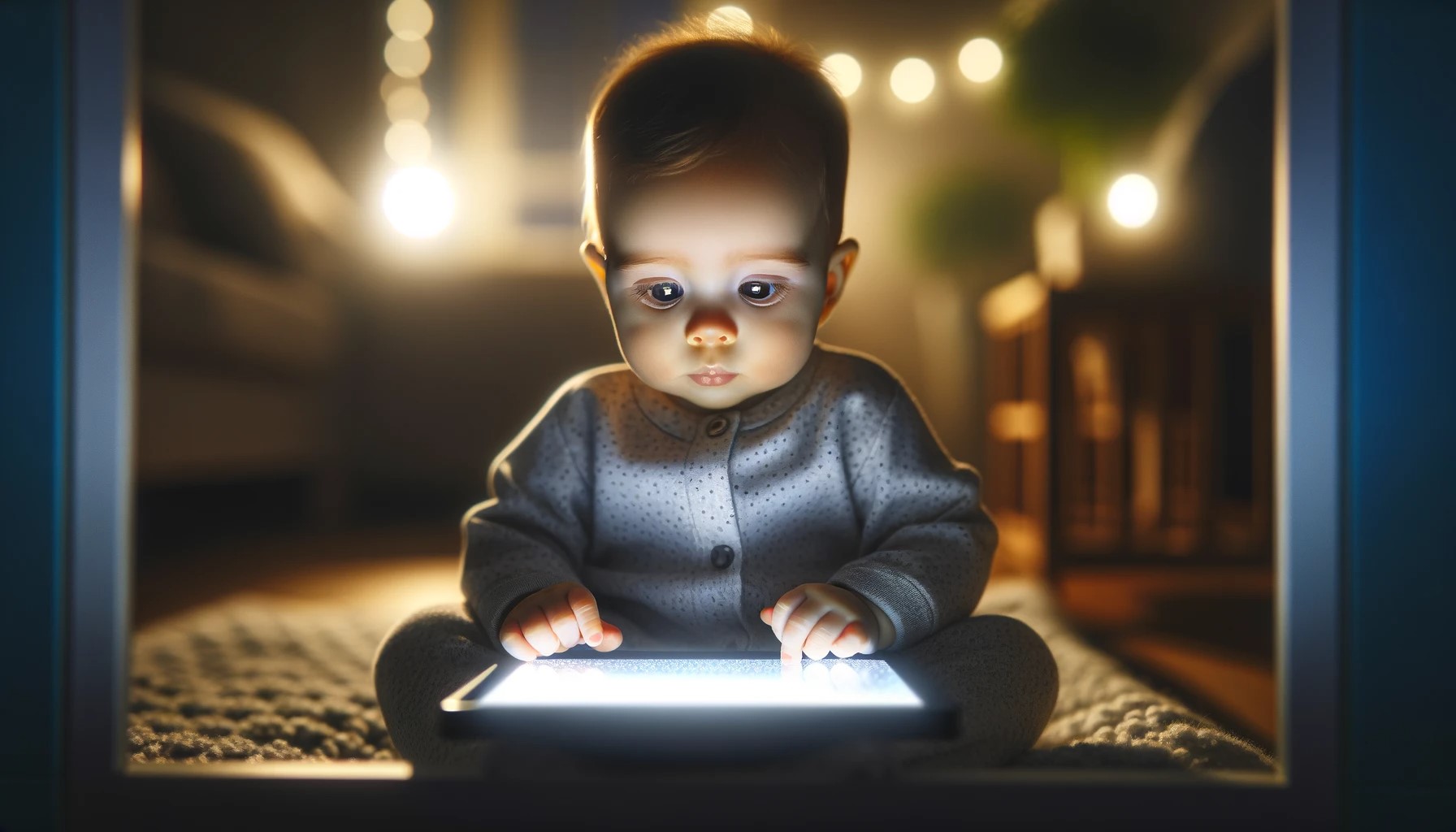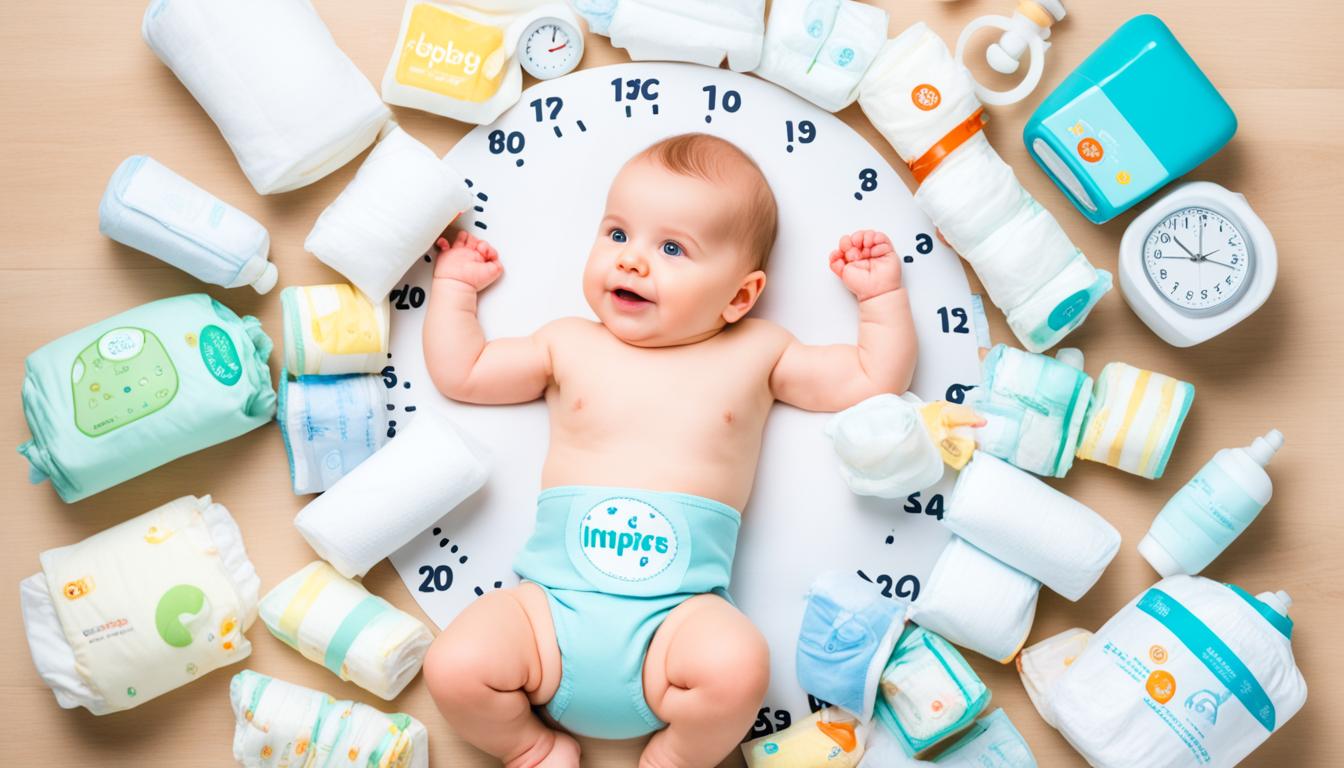Are Electronic Toys Bad For Babies? Insights & Tips
As a parent, you want the best for your baby’s development. But with the abundance of electronic toys on the market, it’s natural to question whether they have a negative impact on your little one. Research has shown that the excessive use of electronic toys can indeed hinder a baby’s language development and social skills. Understanding the effects of electronic toys on infants is essential for making informed decisions about their playtime.
Skip To The Following Sections
Key Takeaways:
- Playing with electronic toys may limit language development and social skills in infants.
- Excessive use of electronic toys can lead to overstimulation and sensory overload, negatively impacting a baby’s development.
- Choosing safe alternatives to electronic toys, such as traditional toys, can promote healthy development and open-ended play opportunities.
- Limiting screen time for babies and engaging them in interactive activities like reading and playing with traditional toys is crucial for their overall well-being.
- Developmental play using interactive toys can enhance sensory exploration, problem-solving skills, and social interaction in infants.
The Potential Negative Effects of Electronic Toys on Baby’s Development
Excessive use of electronic toys can have negative effects on a baby’s development. Studies have shown that these toys can lead to overstimulation and sensory overload, disrupting the natural development of the brain. The flashing lights, loud noises, and multiple buttons of electronic toys can overwhelm babies and make it challenging for them to focus and process sensory information.
Research has indicated that electronic toys can limit language development and social skills in infants. When babies are engaged with electronic toys, they tend to have fewer words spoken to them, fewer back-and-forth conversations with their parents, and fewer vocalizations compared to playing with traditional toys or board books.
“The impact of excessive exposure to electronic toys on babies’ brain and development cannot be underestimated. These toys can interfere with the natural learning processes and may hinder important cognitive and social skills development.” – Northern Arizona University Study
Furthermore, some electronic toys may contain small parts that pose a choking hazard, putting babies at risk. It is essential to prioritize their safety and select toys that are age-appropriate and free from potential hazards.
To promote healthy development, it is recommended to limit screen time and exposure to electronic toys in young children. Instead, focus on providing them with toys that offer more open-ended play opportunities and encourage communication and interaction with adults. Traditional toys such as dolls, blocks, and puzzles can stimulate imagination, problem-solving skills, and fine motor development.
By being mindful of the potential negative effects of electronic toys, parents and caregivers can create a balanced play environment that supports optimal development for their babies.
Choosing Safe Toys for Infants
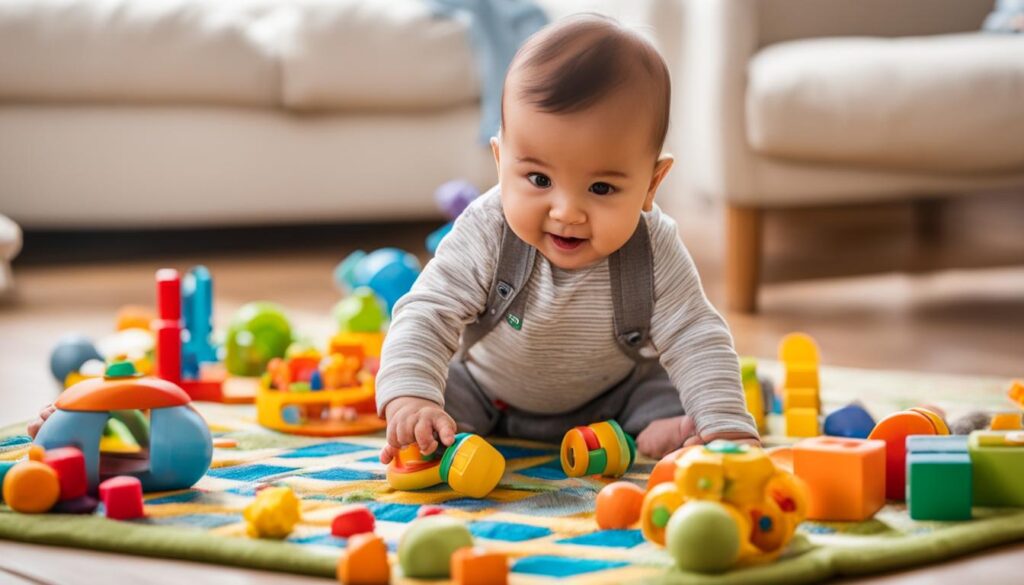
When it comes to selecting toys for your precious little one, safety and developmental benefits should be your top priorities. Choosing the right toys can contribute to their growth and provide endless hours of joy and exploration. Here are some tips to help you make informed decisions and select safe and engaging toys for your infant.
1. Opt for Traditional Toys
Traditional toys have stood the test of time and continue to be excellent choices for infants. Toys such as wooden blocks, dolls, and action figures offer tactile stimulation and encourage imaginative play and social interaction. These open-ended toys provide infants with the opportunity to explore their creativity and learn through play. The simplicity of these toys promotes cognitive development and helps foster problem-solving skills.
2. Consider Board Books for Language Development
Books are not only a source of knowledge but also a fantastic way to promote language development and bonding with your baby. Board books with colorful illustrations and simple stories are perfect for infants. Reading aloud to your little one helps in building their vocabulary, enhancing listening skills, and supporting their overall cognitive development. Snuggle up with your baby and enjoy the magic of storytime together.
3. Look for Developmental Play Opportunities
When selecting toys, keep an eye out for those that promote developmental play. Toys that stimulate multiple senses, such as those with different textures, shapes, and sounds, are excellent choices. These interactive toys encourage infants to engage their senses, develop fine motor skills, and enhance problem-solving abilities. Additionally, look for toys that require turn-taking or ones that promote language development through verbal back-and-forth, encouraging social interaction and improving communication skills.
4. Avoid Small Parts and Choking Hazards
Infants tend to explore the world through their mouths, which makes it crucial to avoid toys with small parts that could pose a choking hazard. Always check the age recommendations and ensure that toys are sturdy and durable. Pay close attention to any detachable parts to prevent accidental swallowing or choking incidents. Safety should always be a top priority when choosing toys for infants.
By choosing safe and developmentally appropriate toys for your infant, you can provide them with valuable learning experiences and promote their overall growth. Opt for traditional toys, consider board books for language development, look for developmental play opportunities, and ensure that the toys you choose do not pose any choking hazards. Remember, playtime is not only fun but also a crucial aspect of your baby’s development.
Limiting Screen Time for Babies
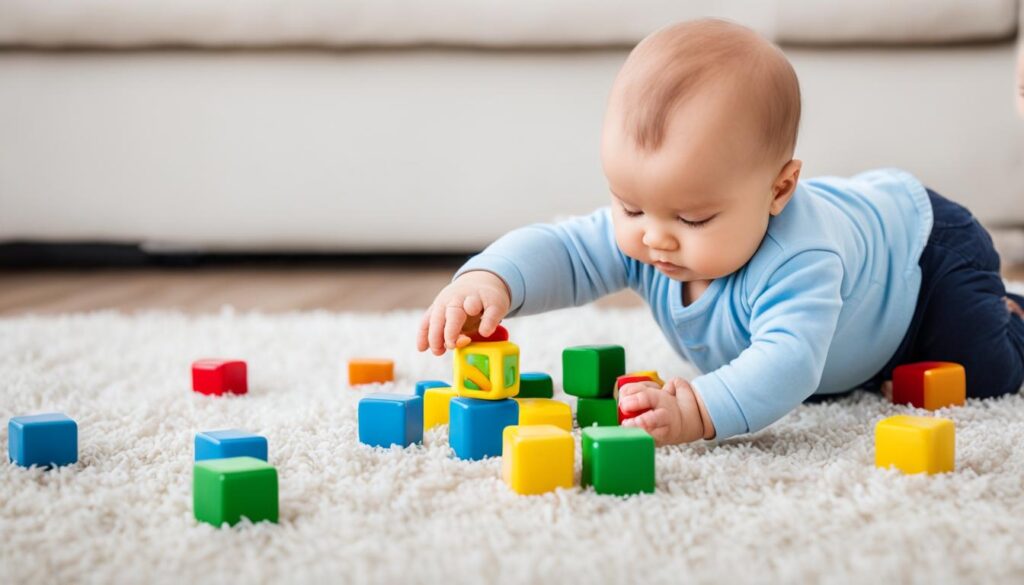
Excessive screen time can have detrimental effects on babies’ development, including language and social skill delays, attention difficulties, and poor sleep quality. It is essential to prioritize healthy alternatives to electronic toys and limit screen time for your little one.
The Dangers of Excessive Exposure to Electronic Toys for Babies
Research has shown that prolonged exposure to electronic toys can negatively impact infant development. The flashing lights, loud noises, and multiple buttons can overstimulate babies, leading to difficulties in focusing and sensory processing. Moreover, excessive screen time has been linked to delays in language and social development, hindering your baby’s overall growth.
“Excessive screen time has been linked to delays in language and social development, hindering your baby’s overall growth.”
Alternatives to Electronic Toys for Babies
Instead of relying on electronic toys for entertainment, engaging babies in interactive activities can foster healthy development. As an alternative, spending quality time reading books, singing songs, and playing with traditional toys can provide numerous benefits.
- Reading aloud to your baby not only promotes early literacy skills but also strengthens the parent-child bond. Choose board books with colorful illustrations to engage your little one’s attention.
- Singing: Nursery rhymes, lullabies, and interactive songs can enhance your baby’s language development and provide sensory stimulation through rhythm and melody. Make it a fun and interactive experience by using hand movements and facial expressions.
- Traditional Toys: Opt for safe, age-appropriate toys such as wooden blocks, soft dolls, and textured balls. These toys promote sensory exploration, fine motor skills, and imaginative play, contributing to your baby’s cognitive and physical development.
By limiting screen time and providing engaging alternatives, you create an environment that promotes healthy growth and development for your baby.
Promoting Developmental Play for Infants
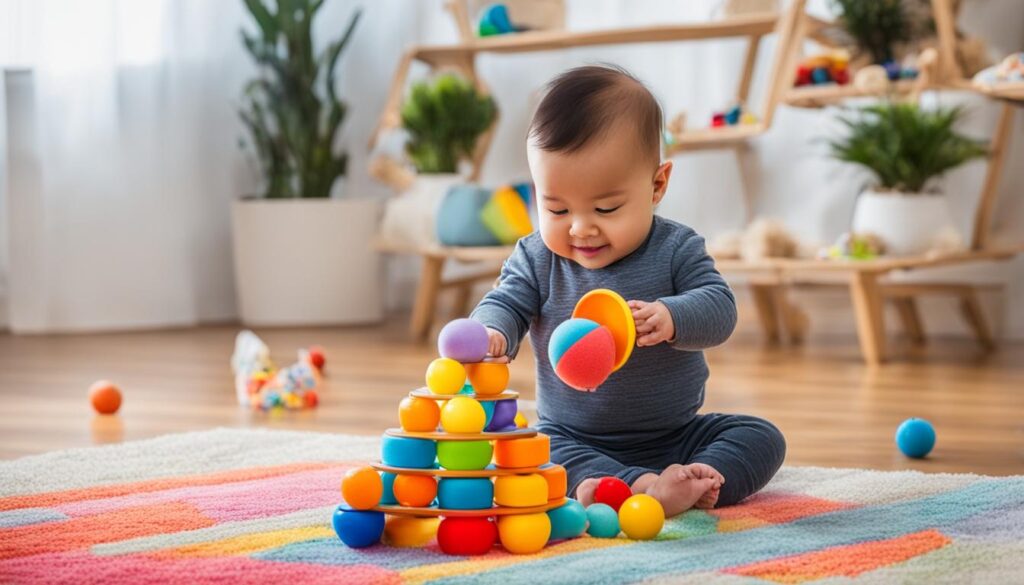
Developmental play is essential for infants as it helps them develop important skills and abilities. Interactive toys provide a great opportunity to promote developmental play in babies. These toys encourage sensory exploration, fine motor skills, and problem-solving, all crucial aspects of their development.
When choosing interactive toys for infants, consider those with different textures, shapes, and sounds that stimulate their senses and encourage exploration. These toys not only entertain but also support the development of their cognitive and sensory skills.
To further enhance their development, it is beneficial to provide infants with toys that promote interaction with adults. These can include toys that require turn-taking or toys that encourage language development through verbal back-and-forth. Such interactive toys facilitate social and emotional development and promote bonding with caregivers.
As you engage in developmental play with your baby, remember that traditional toys still have a valuable role to play. These toys, such as wooden blocks, dolls, and puzzles, allow infants to engage in imaginative play, problem-solving, and fine motor skill development. They foster creativity, social interaction, and cognitive development.
The Benefits of Interactive Toys for Infants:
- Stimulate sensory exploration
- Develop fine motor skills
- Promote problem-solving
- Encourage cognitive development
“Interactive toys provide a hands-on approach to learning for infants, helping them explore the world around them and develop essential skills.”
By incorporating interactive toys into your baby’s playtime, you can promote their cognitive, emotional, and social development. Remember to strike a balance between different types of toys, ensuring that your baby has opportunities for both independent exploration and interactive play.
Next, we will explore the importance of traditional toys for infants and how they contribute to their overall development.
The Importance of Traditional Toys for Infants
When it comes to promoting the healthy development of your baby, traditional toys are invaluable. These open-ended toys, such as blocks, dolls, and puzzles, provide more than just entertainment. They allow infants to engage in imaginative play, problem-solving, and fine motor skill development.
By encouraging creativity, social interaction, and cognitive development, these traditional toys offer a well-rounded play experience. They provide endless opportunities for infants to explore their surroundings, use their imagination, and learn through hands-on exploration. Unlike electronic toys, which often have a predetermined function, traditional toys empower infants to think creatively and come up with their own ways to play.
Moreover, traditional toys that require cooperation and turn-taking help infants develop important social skills. Through playing with these toys, infants learn to communicate, interact, and share with others. This early exposure to social engagement sets the foundation for future relationships and communication skills.
To support the holistic development of your baby, it is essential to provide a variety of traditional toys. Allow them to explore different textures, shapes, and sizes. Offer toys that stimulate their senses and encourage exploration. By promoting developmental play and interaction, these traditional toys become powerful tools in your baby’s growth journey.
FAQ
Are electronic toys bad for babies?
Excessive use of electronic toys can lead to overstimulation and sensory overload in babies, which can negatively affect their development. It is recommended to limit screen time and exposure to electronic toys in young children to promote healthy development.
What are the potential negative effects of electronic toys on baby’s development?
Studies suggest that electronic toys may limit language development and social skills in infants as they offer fewer opportunities for language interaction and communication compared to traditional toys and books. Additionally, the overstimulation caused by flashing lights, loud noises, and multiple buttons can disrupt the natural development of the brain and hinder sensory processing.
How can I choose safe toys for infants?
When selecting toys for infants, it is important to choose developmentally appropriate options that are safe. Traditional toys such as wooden blocks, dolls, and action figures provide tactile stimulation and encourage imaginative play and social interaction. It is recommended to avoid toys with small parts that could pose a choking hazard and to choose toys that promote developmental play and interaction.
How can I limit screen time for babies?
Excessive screen time, including exposure to electronic toys, can have negative effects on a baby’s development. Instead of relying on electronic toys for entertainment, it is recommended to engage babies in interactive activities such as reading, singing, and playing with traditional toys. These activities provide bonding opportunities and promote healthy development.
How can I promote developmental play for infants?
Interactive toys that encourage sensory exploration, fine motor skills, and problem-solving are great options for promoting developmental play. Toys with different textures, shapes, and sounds stimulate the senses and encourage exploration. It is also beneficial to provide infants with toys that promote interaction with adults and encourage language development through verbal back-and-forth.
Why are traditional toys important for infants?
Traditional toys play a crucial role in the holistic development of infants. Open-ended toys such as blocks, dolls, and puzzles allow infants to engage in imaginative play, problem-solving, and fine motor skill development. Additionally, traditional toys that require cooperation and turn-taking help infants develop important social skills and the ability to communicate and interact with others.
Source Links
- https://babame.com/do-light-up-toys-affect-child-development/
- https://thoughtfulparent.com/electronic-versus-traditional-toys-what.html
- https://raisingkidswithpurpose.com/tech-toys-impact-on-kids/

